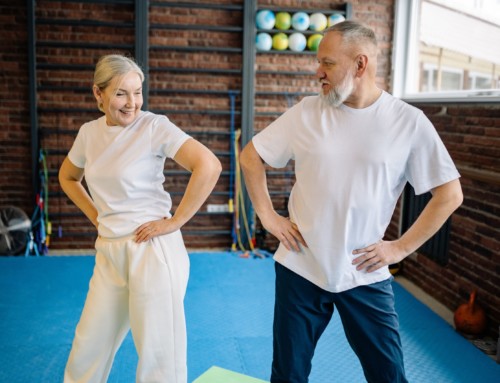As we age, our bodies begin to lose some of the strength, energy, resilience, and vitality of our youth. But there are simple ways that each of us can combat the wearing of years by preventing muscle loss.
Why Strength Train?
Individuals of all ages have begun strength training regimens and experienced a great many benefits. Regular strength training builds strength and helps improve balance to reduce the risk of injury from falls, aids in coordination, increases mobility, helps maintain bone density, and helps the aging adult maintain independence for as long as possible.
Best Practices for Strength Training
Strength training for older adults is very similar to anyone at any age undertaking a strength training regime, though there may be some reduced ability to recover as quickly, as well as reduced initial physical conditioning. If you have health issues, it’s important to talk to your doctor before beginning any strength training routine.
Start Slow – Every new physical ambition requires a slow and measured beginning, and strength training is no different. Starting off your routine at a slow and manageable pace not only helps you prevent injury, but it helps to keep you from abandoning a routine that is too challenging.
Evolve Your Routine – Over time, muscles adapt and individuals may plateau at a certain level of strength. Continue to push yourself and increase the weight you are using if you can do more than ten to twelve repetitions of an exercise at a time. Challenging your muscles helps them grow and continue to strengthen and build mass.
Maintain Your Motivation – Lasting changes can only come with disciplined motivation. Remind yourself why you are strength training, and of the physical and emotional benefits it provides. Remember to celebrate your achievements and set achievable and measurable goals.
Simple Strength Training Exercises
Strength training can be as simple as a few compound exercises that target many muscles at once, or many individual movements to isolate one specific muscle group at a time. Here are a few compound muscle movements that are simple to do and provide great results:
- Squats – Squats build the quadriceps, hamstrings, calves, and can help strengthen the entire body. Stand with feet slightly further than shoulder-width apart, and slowly squat yourself down to a near-sitting position, being careful not to let your knees come forward past your toes. Pause, and then raise yourself back to a standing position.
- Overhead Presses – Overhead presses target the arms, upper back, and shoulders. Stand or sit with feet shoulder-width apart. Hold dumbbells in your hands and raise your arms parallel to the floor. Slowly raise the dumbbells over your head until your arms are straight above you, then slowly lower them back to shoulder level.
- Wall Pushups – Push ups don’t have to be intimidating. Choose a wall or a high bench to lean your hands against, and build strength by performing controlled pushups at the angle of your choice.
- Step-ups – Requiring only a bench or a stair, step-ups help improve balance and strengthen legs, hips, and buttocks. Place your right foot on a stair and slowly step up, straightening your leg and lifting your left foot. Then slowly bend your right leg and lower your left foot back down to the ground. Repeat on the other side for a determined number of reps.
- Recovery – Make sure not to train the same muscle groups two days in a row, and give yourself ample time to recover after each workout. Adding techniques like foam rolling and massage into your recovery plan can also help you to bounce back harder from workouts, and reduce stiffness.
Strength training doesn’t have to take up significant time. By performing just two to three manageable sessions a week, you can begin to greatly increase your fitness level and experience a more enjoyable life. The benefits of strength training extends beyond muscle gain. It can help make activities of daily life simpler, improve mood and help alleviate depression, help you sleep better, increase bone density, increase metabolism, and provide you with opportunities to socialize and bond with other individuals.





